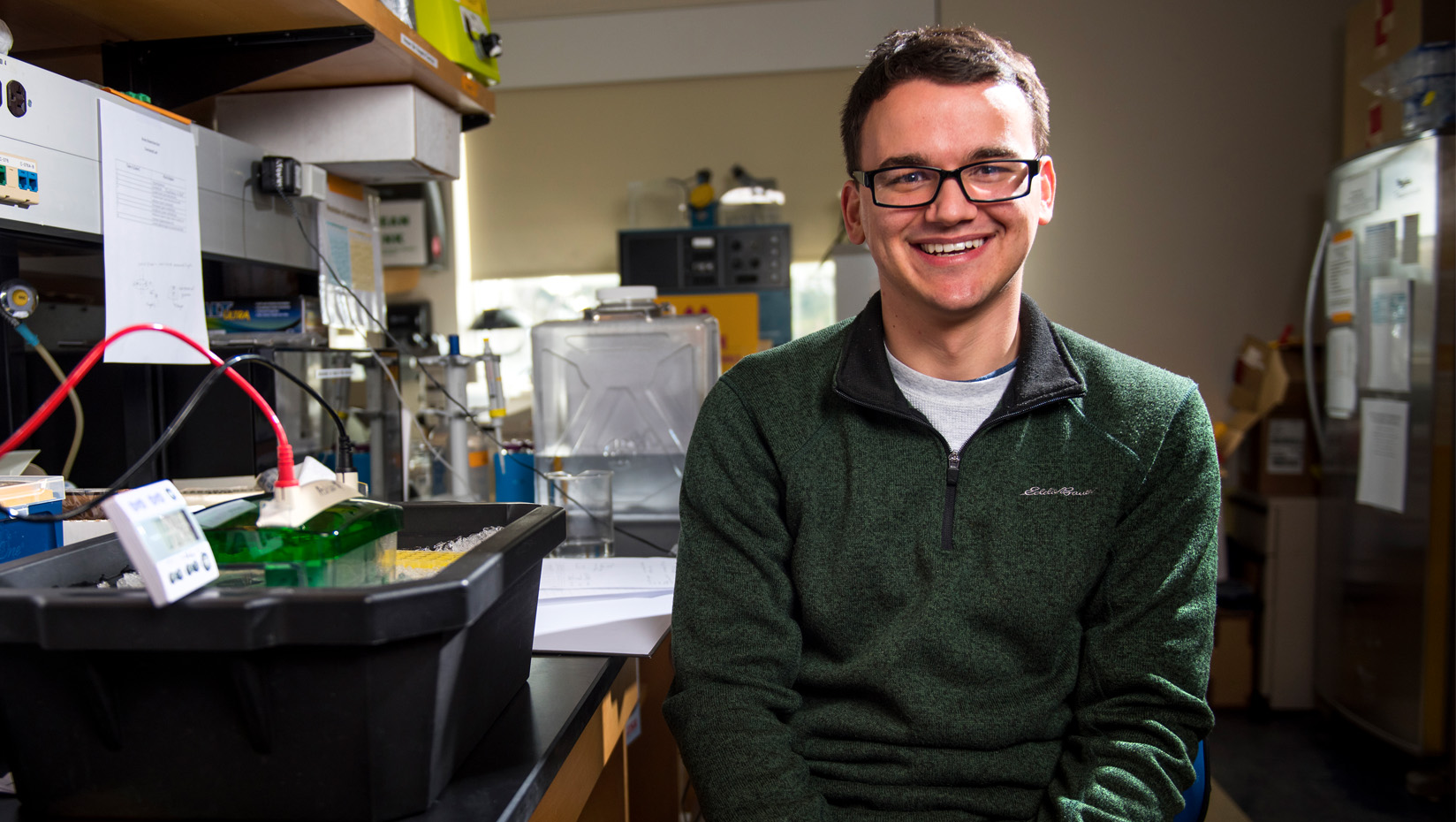
Cameron Fudge: Transfer student drawn to UMaine for biomedical research experience
In January 2017, while Cameron Fudge was a student at Southern Maine Community College in Portland, he took a weeklong biomedical training course taught by Kristy Townsend, an assistant professor of neurobiology at the University of Maine.
The course, which was offered to SMCC students, focused on investigating fatty liver disease and took students through common cell and molecular techniques that would be used in biomedical research. Professional development and biomedical career topics also were covered.
“We gained fundamental experience in how to culture cells, expose cells to different fatty treatments, and then capitulate those results in a meaningful way,” says Fudge of Farmingdale, Maine. “Furthermore, the course taught us an overview of bioinformatics, professional development in biology, and allowed us to make personal connections with our instructors.”
After completing the course, Fudge transferred to UMaine in fall 2017 to pursue a bachelor’s degree in biology and a minor in business administration.
“I chose to transfer to UMaine because it was an in-state research institution with a solid reputation,” he says. “I knew this institution had readily available research opportunities for undergraduate students, and that was my main focus when looking at schools.”
He is now researching adult neural plasticity in Townsend’s lab.
Why did you decide to take Townsend’s biomedical training course?
I want to understand core aspects from a broad range of biological disciplines. Understanding cell culture and cell biology was, at the time, an area where I wasn’t necessarily proficient. Developing an understanding of the techniques used within the short course allowed me to turn around and assist with the course the following year. Furthermore, from the experience I gained, I was able to become the Maine Learning Assistant for BIO 480 Cell Biology this semester.
Describe the current research you are working on in Townsend’s lab:
The research I’m working on surrounds the regulation of energy balance by a subset of brain cells located within the hypothalamus. We’re interested in manipulating these cells and assessing changes within how the body responds to different dietary stimuli. This research could impact conditions such as obesity, diabetes and other metabolic ailments.
What interests you about this topic and biomedical research in general?
I’m interested in biomedical research because I’m curious about how life works. Moreover, I gain fulfillment conducting work with the potential profound impact we can have on improving human longevity. Particularly, this project focuses on diabetes, obesity and metabolic dysfunction, which are currently at epidemic levels within the United States. There is so much we don’t understand about the brain, and I believe this research will have far-reaching implications ultimately helping an immeasurable number of people. I’m proud, and lucky, to be a part of research like this.
Describe what it’s like working with Townsend. How has her guidance made your UMaine experience better?
Townsend has been an excellent mentor. Working in her lab has given me a different perspective on how to do ‘good’ science, and exposed me to techniques and experiences I wouldn’t have otherwise been able to perform. Townsend, and the other students working in her lab, have all served as invaluable friends, mentors and colleagues. The relationships I developed working in this lab have directly contributed to both my success as an aspiring scientist and a well-rounded student.
What difference has UMaine made in your life and in helping you reach your goals?
UMaine has provided an excellent amount of opportunity to do research and develop meaningful relationships with people along the same path. I believe the community here at UMaine is fantastic and promotes creativity and inclusiveness, especially for a transfer student. I’ve met a lot of excellent people and done a lot of excellent research since I’ve been here.
Beyond academics, what extracurricular activities occupy your time?
Outside of school I’m working on a paper with MDI Biological Laboratory, so science incorporates much of my time. Aside from that, I’m an avid runner, I play intramural sports, and I’ve started working on a novel. I also enjoy hiking, camping, fishing and taking advantage of many of the natural wonders that we’re blessed with in the state of Maine.
What are your plans for after graduation?
Right now, I’m interested in going to graduate school to pursue a Ph.D. in biomedical science. I’m taking a business minor so I can hopefully work in an industrial setting designing products that improve quality of life for all.
Contact: Elyse Catalina, 581.3747
